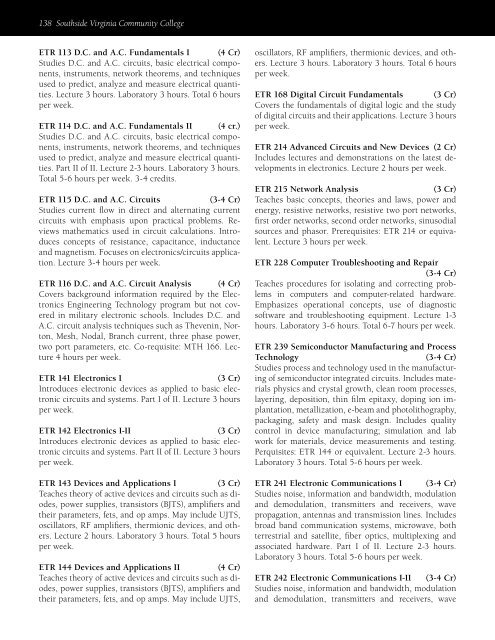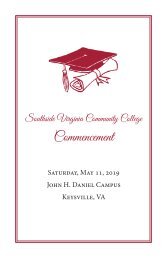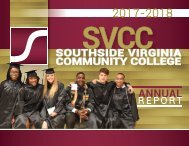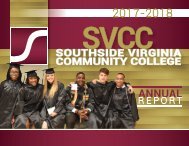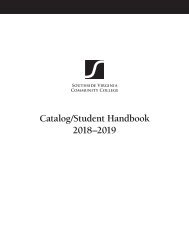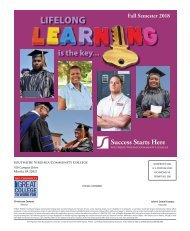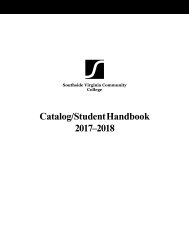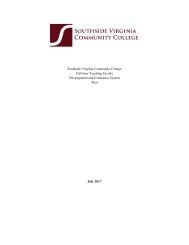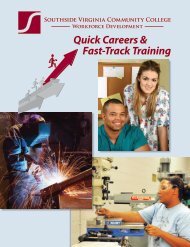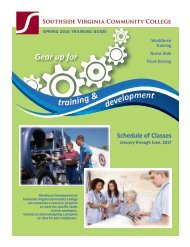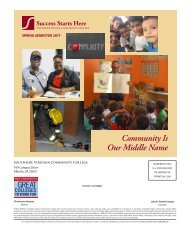SVCC Catalog 2017-2018
The programs and courses offered at Southside Virginia Community College. To learn more, go to www.southside.edu
The programs and courses offered at Southside Virginia Community College. To learn more, go to www.southside.edu
You also want an ePaper? Increase the reach of your titles
YUMPU automatically turns print PDFs into web optimized ePapers that Google loves.
138 Southside Virginia Community College<br />
ETR 113 D.C. and A.C. Fundamentals I (4 Cr)<br />
Studies D.C. and A.C. circuits, basic electrical components,<br />
instruments, network theorems, and techniques<br />
used to predict, analyze and measure electrical quantities.<br />
Lecture 3 hours. Laboratory 3 hours. Total 6 hours<br />
per week.<br />
ETR 114 D.C. and A.C. Fundamentals II (4 cr.)<br />
Studies D.C. and A.C. circuits, basic electrical components,<br />
instruments, network theorems, and techniques<br />
used to predict, analyze and measure electrical quantities.<br />
Part II of II. Lecture 2-3 hours. Laboratory 3 hours.<br />
Total 5-6 hours per week. 3-4 credits.<br />
ETR 115 D.C. and A.C. Circuits<br />
(3-4 Cr)<br />
Studies current flow in direct and alternating current<br />
circuits with emphasis upon practical problems. Reviews<br />
mathematics used in circuit calculations. Introduces<br />
concepts of resistance, capacitance, inductance<br />
and magnetism. Focuses on electronics/circuits application.<br />
Lecture 3-4 hours per week.<br />
ETR 116 D.C. and A.C. Circuit Analysis (4 Cr)<br />
Covers background information required by the Electronics<br />
Engineering Technology program but not covered<br />
in military electronic schools. Includes D.C. and<br />
A.C. circuit analysis techniques such as Thevenin, Norton,<br />
Mesh, Nodal, Branch current, three phase power,<br />
two port parameters, etc. Co-requisite: MTH 166. Lecture<br />
4 hours per week.<br />
ETR 141 Electronics I<br />
(3 Cr)<br />
Introduces electronic devices as applied to basic electronic<br />
circuits and systems. Part I of II. Lecture 3 hours<br />
per week.<br />
ETR 142 Electronics I-II<br />
(3 Cr)<br />
Introduces electronic devices as applied to basic electronic<br />
circuits and systems. Part II of II. Lecture 3 hours<br />
per week.<br />
ETR 143 Devices and Applications I (3 Cr)<br />
Teaches theory of active devices and circuits such as diodes,<br />
power supplies, transistors (BJTS), amplifiers and<br />
their parameters, fets, and op amps. May include UJTS,<br />
oscillators, RF amplifiers, thermionic devices, and others.<br />
Lecture 2 hours. Laboratory 3 hours. Total 5 hours<br />
per week.<br />
ETR 144 Devices and Applications II (4 Cr)<br />
Teaches theory of active devices and circuits such as diodes,<br />
power supplies, transistors (BJTS), amplifiers and<br />
their parameters, fets, and op amps. May include UJTS,<br />
oscillators, RF amplifiers, thermionic devices, and others.<br />
Lecture 3 hours. Laboratory 3 hours. Total 6 hours<br />
per week.<br />
ETR 168 Digital Circuit Fundamentals (3 Cr)<br />
Covers the fundamentals of digital logic and the study<br />
of digital circuits and their applications. Lecture 3 hours<br />
per week.<br />
ETR 214 Advanced Circuits and New Devices (2 Cr)<br />
Includes lectures and demonstrations on the latest developments<br />
in electronics. Lecture 2 hours per week.<br />
ETR 215 Network Analysis<br />
(3 Cr)<br />
Teaches basic concepts, theories and laws, power and<br />
energy, resistive networks, resistive two port networks,<br />
first order networks, second order networks, sinusodial<br />
sources and phasor. Prerequisites: ETR 214 or equivalent.<br />
Lecture 3 hours per week.<br />
ETR 228 Computer Troubleshooting and Repair<br />
<br />
(3-4 Cr)<br />
Teaches procedures for isolating and correcting problems<br />
in computers and computer-related hardware.<br />
Emphasizes operational concepts, use of diagnostic<br />
software and troubleshooting equipment. Lecture 1-3<br />
hours. Laboratory 3-6 hours. Total 6-7 hours per week.<br />
ETR 239 Semiconductor Manufacturing and Process<br />
Technology<br />
(3-4 Cr)<br />
Studies process and technology used in the manufacturing<br />
of semiconductor integrated circuits. Includes materials<br />
physics and crystal growth, clean room processes,<br />
layering, deposition, thin film epitaxy, doping ion implantation,<br />
metallization, e-beam and photolithography,<br />
packaging, safety and mask design. Includes quality<br />
control in device manufacturing; simulation and lab<br />
work for materials, device measurements and testing.<br />
Perquisites: ETR 144 or equivalent. Lecture 2-3 hours.<br />
Laboratory 3 hours. Total 5-6 hours per week.<br />
ETR 241 Electronic Communications I (3-4 Cr)<br />
Studies noise, information and bandwidth, modulation<br />
and demodulation, transmitters and receivers, wave<br />
propagation, antennas and transmission lines. Includes<br />
broad band communication systems, microwave, both<br />
terrestrial and satellite, fiber optics, multiplexing and<br />
associated hardware. Part I of II. Lecture 2-3 hours.<br />
Laboratory 3 hours. Total 5-6 hours per week.<br />
ETR 242 Electronic Communications I-II (3-4 Cr)<br />
Studies noise, information and bandwidth, modulation<br />
and demodulation, transmitters and receivers, wave


